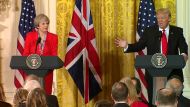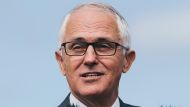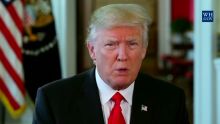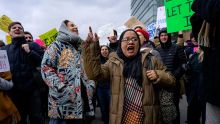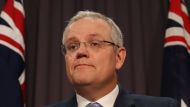Washington: British Prime Minister Theresa May did well to get to the head of the queue of foreign leaders wanting to meet Donald Trump, but even before she got to the Oval Office on Friday, her trans-Atlantic dash had been overshadowed by the two big egos – all eyes had turned to a planned phone hook-up between Trump and Vladimir Putin the next day.
May was threading needles as she went – as a respectable British woman she needed to be careful not to fawn over the new US president. But at the risk of being just a rock in the Atlantic after the Brexit shock, she had a greater need for optics that said: despite walking away from Europe, Britain still was in the big league.
More World News Videos
Trump: Brexit 'wonderful' for UK
In a joint news conference at the White House with British Prime Minister Theresa May, U.S. President Donald Trump says he thinks Brexit will be "wonderful" for the UK.
So as they emerged from the Oval Office she allowed Trump to hold her hand – brave woman!
That's the British for you. The same bravery as stoicism infuses the BBC, which reported straight-faced: "Theresa May's presence seemed to bring out a more restrained Donald Trump. Could she be building an image, a role, as a good influence on the rogue president?"
May's bravery extended to her speaking for Trump. Whatever transpired in their meeting, it was the British prime minister, not the American president, who told reporters that Trump was "100 per cent behind NATO" and that their two countries had an "unshakeable commitment" to the alliance – the one Trump has been bagging as "obsolete" for all of the last year.
To which Trump mouthed silently: "True."
Surely she didn't believe him. Nonetheless, it would have been useful for her to get him on the record – sort-of.
Trump, however, was not as obliging on the question of the sanctions imposed on Russia as punishment for its annexation of Crimea – and which Moscow is desperate to have lifted. Trump has indicated he is willing to review the sanctions.

On this, May stood her ground, telling reporters at their joint press conference that the sanctions must remain until elections are held in Ukraine's war torn east and Russia guarantees Ukraine's control of its eastern border and allow international monitors full access to the conflict zone.
On the Russian leader, Trump said: "As far as Putin and Russia, I don't say good, bad or indifferent – I don't know the gentleman. I hope we have a fantastic relationship. That's possible, and it's also possible that we won't. We will see what happens.

"I will be representing the American people very, very strongly, very forcefully and, if we have a great relationship with Russia and other countries, and if we go after ISIS together – that's an evil that has to be stopped – I will consider that a good thing, not a bad thing."
It turned out that May was making nice. On Thursday, speaking to a retreat for GOP members of congress in Philadelphia, her message was stated more bluntly – Putin, she told them, was not to be trusted.

The Trump-May meeting was remarkable as a measure of history's march. The notion of Sir Winston Churchill's "special relationship" was very much alive when Margaret Thatcher stepped out with Ronald Reagan and was still alive in the days of Tony Blair and George W Bush – even if Blair was mocked at home as "Bush's poodle."
More recently, Barack Obama never quite got Britain – for him, Germany's Angela Merkel was the real power on the other side of the pond. And for Trump, like it or not London, the three most important figures in Europe are Putin, Putin and Putin.
Viewed from Trump's Washington, Britain is a lost empire in need of a post-Brexit lifeline – but Russia is a re-emerging empire. And the Trump-Putin agenda dwarfs May's to-do list.
It was to May's advantage that she could meet Trump personally. But by lunchtime Friday her meeting was on a par with a couple of other phone calls Trump was to make Saturday – to Merkel and to French President François Hollande.
The meeting was useful for the president too. As his first with a foreign leader and at the end of a chaotic first week in office, the optics were good for him too – in the sense of him being seen by the world to be able to get through such an encounter without needing to litigate questions of crowd sizes or who really won the popular vote for the presidency.
The best that May could come up with, in response to a question on what she and Trump had in common was that she and Trump would champion "ordinary working people." That didn't have the same ring to Bush's response when asked what he and Blair had in common – "we both use Colgate toothpaste."
What Trump and May do have in common is the need for a bilateral trade deal – coming out of the European Union, Britain needs to shore up its new and lonelier trade standing.
But when May talks of the post-EU Britain as 'global' and 'internationalist," Trump likely rolls his eyes. And if she got to telling him of her support for the Iran nuclear deal that Trump wants to shred and her defence of Islam as a 'peaceful religion,' and not a 'cancer' as it is viewed in the new US administration, Trump might have been tempted to hurl the Churchill bust that has been returned to the Oval Office since Obama's departure.
Segueing, during their press conference from the particulars of Russian relations to the generality of foreign relationships, Trump was ebullient: "if we can have a great relationship with Russia, and China, and all countries, I'm all for that, that would be a tremendous asset. No guarantees, but if we can, that would be a positive, not a negative."
In Washington the message was fair enough. But in New York, the president's newly appointed ambassador to the United Nations, Nikki Haley, was channeling the Trump we know, using her first visit to UN headquarters to warn the world of the administration's expectations.
"You're going to see a change in the way we do business," she said. "Our goal with the administration is to show value at the UN, and the way we'll show value is to show our strength, show our voice, have the backs of our allies and make sure our allies have our back as well.
"For those who don't have our back, we're taking names; we will make points to respond to that accordingly."


